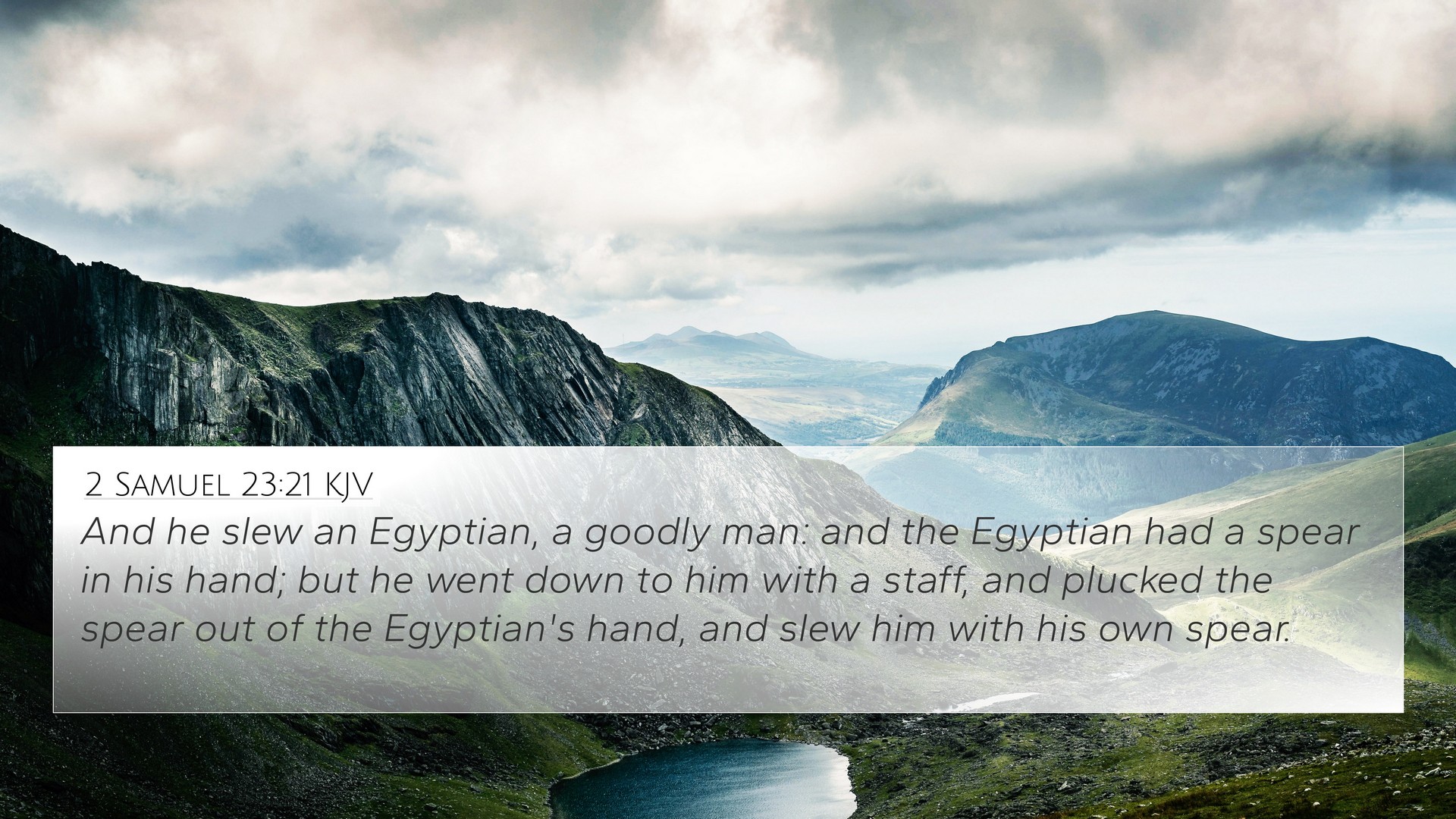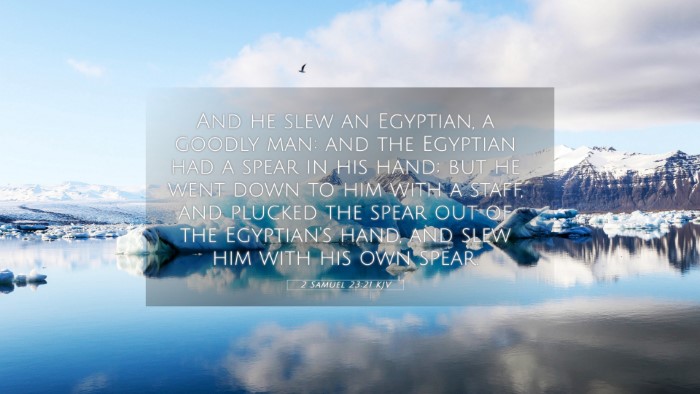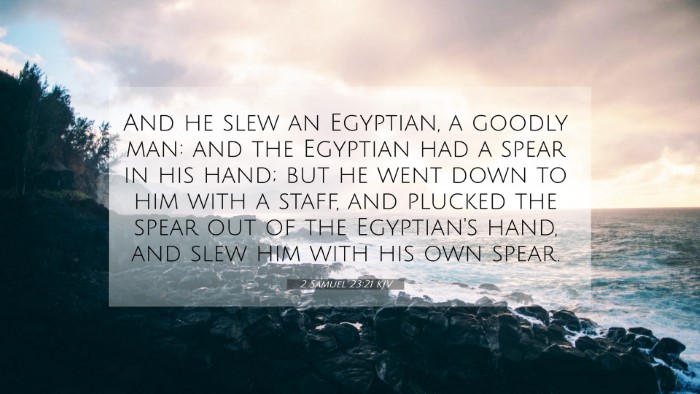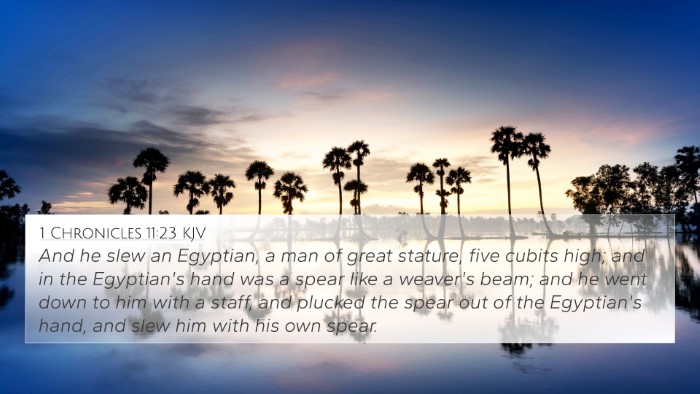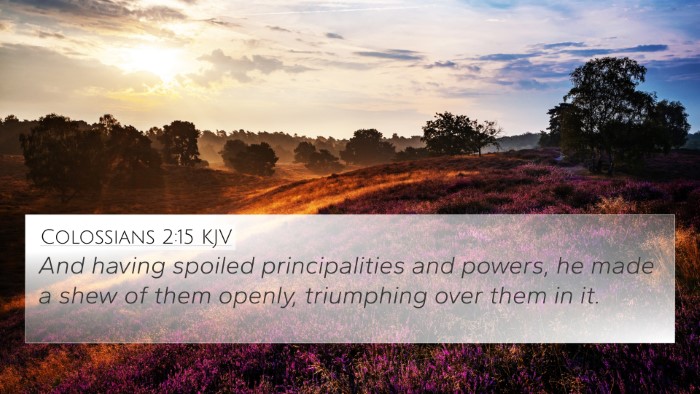Understanding 2 Samuel 23:21
Verse: 2 Samuel 23:21 - "And he slew an Egyptian, a goodly man: and the Egyptian had a spear in his hand; but he went down to him with a staff, and plucked the spear out of the Egyptian's hand, and slew him with his own spear."
Verse Summary
This verse is part of a passage that highlights the deeds of David's mighty men, showcasing their valor and bravery. In this instance, the focus is on one of the warriors who encounters an Egyptian, defeating him despite the odds.
Interpretation and Commentary
- Matthew Henry's Commentary: Henry emphasizes the greatness of the soldier's courage, suggesting that he was bold not only in his actions but also in prevailing over a formidable opponent. This action depicts a greater principle of trusting in God's strength over physical weapons. The warrior's ability to turn the Egyptian's weapon against him is symbolic of divine providence.
- Albert Barnes' Notes: Barnes notes the significance of the warrior's choice to confront the Egyptian with a mere staff rather than a weapon of equal measure. This choice illustrates the element of faith and reliance on God rather than on military power. The verse encapsulates the theme of overcoming adversity through divine empowerment and swift action.
- Adam Clarke's Commentary: Clarke highlights the effectiveness of the warrior's strategy. By utilizing the Egyptian's own spear against him, it demonstrates skill and cunning in battle. Clarke draws parallels between this act and the larger narrative of God empowering individuals to achieve victories that seem unlikely.
Thematic Connections
This verse reflects several themes found throughout the Bible, including:
- Courage in Adversity: The act of facing a strong opponent implies the necessity of courage that is evident in various other biblical accounts.
- Divine Empowerment: The idea that God equips His followers to overcome battles, symbolic of spiritual warfare against evil.
- The use of Enemies’ Weapons: The tactic of using an enemy's own tools against them echoes through several narratives, representing God’s ultimate control over situations.
Cross-References
2 Samuel 23:21 can be linked to several other Bible passages that reinforce its themes:
- 1 Samuel 17:47: "And all this assembly shall know that the Lord saveth not with sword and spear: for the battle is the Lord's, and he will give you into our hands." - Here, David speaks of God's role in battle.
- Psalm 20:7: "Some trust in chariots, and some in horses: but we will remember the name of the Lord our God." - Reinforces the idea of reliance on God over physical might.
- Romans 8:31: "What shall we then say to these things? If God be for us, who can be against us?" - A New Testament affirmation of God's support in the face of challenges.
- Isaiah 54:17: "No weapon that is formed against thee shall prosper; and every tongue that shall rise against thee in judgment thou shalt condemn." - Examples of divine protection.
- 1 Corinthians 1:27: "But God hath chosen the foolish things of the world to confound the wise; and God hath chosen the weak things of the world to confound the things which are mighty." - Emphasizing God's choice of the less likely for greatness.
- Psalm 18:39: "For thou hast girded me with strength unto the battle: thou hast subdued under me those that rose up against me." - A psalm that reflects on God's empowerment in conflict.
- Exodus 14:14: "The Lord shall fight for you, and ye shall hold your peace." - Another assurance of God's presence in battles.
Conclusion
2 Samuel 23:21 serves as a powerful reminder of the strength available to those who trust in God amid the trials of life. Through the courage displayed in this verse, we see a reflection of the faith and reliance on divine assistance that resonates across the scriptures. The act of using an enemy's weapon against them not only shows tactical prowess but also embodies the greater biblical narrative of overcoming evil through reliance on God.
Further Reflection
For those looking to delve deeper into cross-referencing biblical texts, tools like a Bible concordance or a Bible cross-reference guide can be invaluable resources for understanding connections between verses. Engaging in cross-reference Bible study can reveal the intricate themes that bind various passages together, enhancing one’s comprehension of scripture.
Study Resources
- Bible Study Tools: Explore various aids in your personal study, including concordances, cross-reference systems, and thematic studies.
- Comparative Bible Study: Evaluate links between the Old and New Testament to enrich understanding of prophecy and fulfillment.
- Group Study Materials: Utilize cross-referencing Bible study methods in group settings, fostering discussions around interpreted themes.
